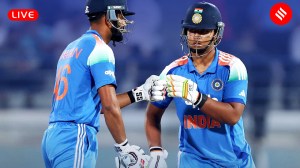Click here to join Express Pune WhatsApp channel and get a curated list of our stories
TMC scales back operations partially, shares guidelines on action plan during pandemic
The Centre has shared some of its best practices and guidelines across the National Cancer Grid, a network of 207 cancer centres to ensure fallback option in case of mass quarantine.
 Tata Memorial Centre, which treats over 70,000 patients each year, has drawn up a set of guidelines on, among other issues, prioritising care for cancer patients in the middle of a pandemic. (Source: Getty Images)
Tata Memorial Centre, which treats over 70,000 patients each year, has drawn up a set of guidelines on, among other issues, prioritising care for cancer patients in the middle of a pandemic. (Source: Getty Images)
Amid reports of critical care of non-Covid patients suffering as the healthcare system tries to deal with thousands of corornavirus cases, the Tata Memorial Centre (TMC), India’s largest cancer hospital, continues to provide cancer care but has scaled back operations by about one third, Tata Memorial Hospital chief Dr. C S Pramesh told The Indian Express. “Since the lockdown, we have diagnosed 40 cancer patients with COVID-19 and while two, who were in advanced stages of cancer, succumbed to the infection, the others are doing fairly well,” said Dr. Pramesh.
Not all potential patients are screened for COVID-19, he said.
“We do not routinely test our patients for COVID-19 before treatment despite TMC being an ICMR-recognised Covid testing centre where close to 100 tests are performed daily. However, the tests are conducted in cancer patients with symptoms of fever and sore throat and the positive rate is approximately seven per cent,” said Dr. Pramesh.
Tata Memorial Centre, which treats over 70,000 patients each year, has drawn up a set of guidelines on, among other issues, prioritising care for cancer patients in the middle of a pandemic.
The Centre has shared some of its best practices and guidelines across the National Cancer Grid, a network of 207 cancer centres. These include creating a core COVID-19 group, daily debriefings of action plan, avoiding complex surgeries that require multiple blood transfusions and prolonged ICU stays, stringent restriction of patients at OPDs and in-patient wards, and rotation of staff to ensure fallback option in case of mass quarantine, Dr. Pramesh told The Indian Express.
Moreover, in the April 28 issue of the New England Journal of Medicine, Dr. Pramesh and TMC director Dr. Rajendra Badwe have pointed out that even a slowdown in clinical services is likely to have a substantial impact on outcomes. Although cancer is often not immediately life threatening, treatment services are also not entirely elective, and delaying care can have serious adverse consequences.
At TMC, some degree of scaling back was required to allow for physical distancing in clinics, said Dr. Pramesh. But de-escalation of services has been far less pronounced than the cuts made at similar cancer facilities globally, he said.
Patients with potentially curable disease, who could substantially benefit from treatment, are given high priority, whereas care for patients who were being treated with palliative intent, especially those for whom interventions are expected to have marginal benefit, is being deferred. Decisions about care for individual patients are made by balancing the risk that patients will contract COVID-19 because of exposures associated with cancer treatment — and their risk for complications if they do — with the benefits of receiving potentially lifesaving cancer treatment.
We have already learned a great deal from this pandemic. The rapidly-evolving nature of the pandemic meant that we needed the full and unconditional support of our large body of employees. We gained this support by establishing open electronic-communication channels and a process for shared decision-making, despite circumstances that preclude face-to-face meetings,” Dr. Badwe told The Indian Express.
Cancer surgeons across Pune also said early detection and screening for cancers has been deferred for a while as they are following guidelines sent by the Tata Memorial Cancer Centre on which cases should be prioritised.
Dr. C B Koppiker, breast cancer surgeon and founder of Prashanti Cancer Care Mission, said they have been following suggestions and guidelines from both international webinars and the TMC. “Those patients who needed urgent chemotherapy were treated, while low-grade breast tumour patients were put on hormonal therapy. We are also responding to patient calls for examination of lumps in the breast and getting a biopsy done,” said Dr. Koppiker.
Oral cancer surgeon Dr. Kamlesh Bokil pointed out that necessary precautions are taken while conducting oral surgery. “We attended several emergencies, including perforated gastric ulcer and others, and adequate protection is taken while performing the surgery,” Dr. Bokil said.
Click here to join Express Pune WhatsApp channel and get a curated list of our stories








